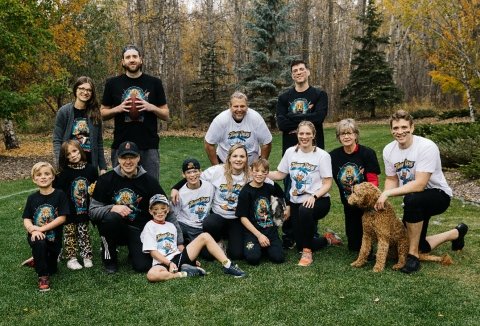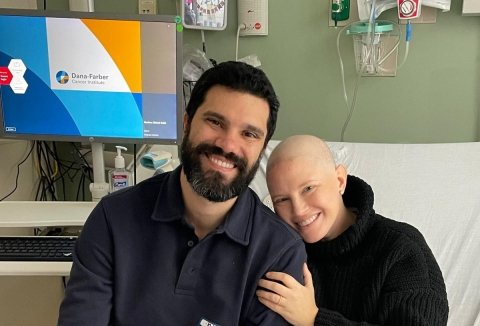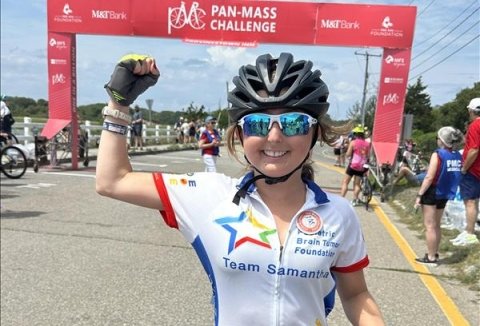Young mom faces rectal cancer—and Lynch syndrome—diagnosis
Stephanie's cancer journey leads to a Lynch syndrome diagnosis, sparking family genetic testing and inspiring her husband's marathon run for Dana-Farber.
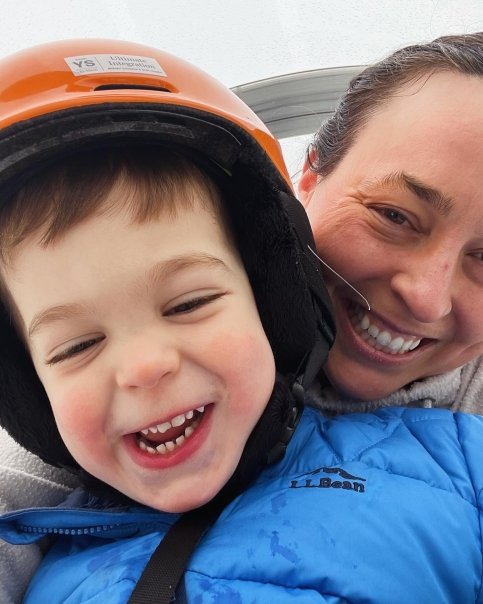
For Stephanie Dobson, mom of two young children, the hardest part of being diagnosed with cancer at age 34, in September 2023, wasn’t the prospect of her own looming treatment. Rather, it was the discovery that she had Lynch syndrome, a genetic condition that raises the risks of some cancers, including rectal, and that her children, only four months and two years old at the time of her diagnosis, may have inherited the same predisposition.
Lynch syndrome is an inherited condition that increases the risk of cancers including rectal, colon, uterine, ovarian, kidney, bladder, stomach, small intestine, pancreatic, and biliary tract cancers. Roughly 1 in 300 people in the United States are estimated to have Lynch syndrome, but many are unaware they have it until a family member is diagnosed with a cancer caused by Lynch syndrome. Stephanie is the first member of her family to be diagnosed with Lynch, and while it was shocking, as her family has a limited cancer history, with no colorectal cancer, her diagnosis at such a young age, and with a high microsatellite instability (MSI) status, a genetic marker, made the news less surprising.
“I found out about my Lynch diagnosis several weeks after my cancer diagnosis. I had already gone through the whirlwind of getting diagnosed with stage III cancer, figuring out a treatment plan, and starting treatment. I was feeling pretty good about my ability to handle it all going forward and had great support, but the thought of the people I loved most in the world—my kids, my younger siblings, having to go through that experience—was the hardest part of those months for me,” Stephanie explains.
“Once I found out about the genetic abnormality, we knew we wanted Dr. Yurgelun since he has treated similar patients and that was really reassuring,” Stephanie says of her oncologist, Matthew Yurgelun, MD, director of Dana-Farber Cancer Institute’s Lynch Syndrome Center. “We never realized how lucky we were to live in Boston, close to such amazing hospitals, until we needed the care.”
When Stephanie met with Yurgelun, she learned she was a candidate for a new immunotherapy treatment that had shown success in patients like her in an August 2022 study. They started treatment right away and so far, it’s working. “My tumor is shrinking really quickly, which is really exciting, and I’ve felt good. This treatment is a lot less toxic than most chemo, and I feel lucky I’ve had such a different experience,” explains Stephanie, who is grateful to have fewer side effects as she cares for her young children and has returned to work full time after her daughter’s May 2023 birth.
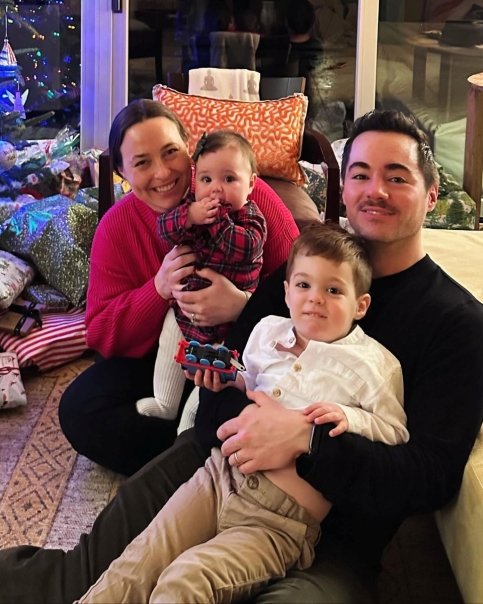
Before her diagnosis, Stephanie had a number of gastrointestinal (GI) symptoms that she chalked up to side effects of two pregnancies and births in three years. But when symptoms persisted after her daughter was born, Stephanie’s primary care doctor encouraged her to see a GI specialist, who booked her for a colonoscopy in September 2023.
“I tried a lot of things to figure it out by myself, before the colonoscopy,” Stephanie explained, crediting her primary care doctor for taking her symptoms seriously, with the recent rise in colorectal cancer in young adults. “I’ve historically just dealt with the symptoms, but you need to trust your gut, listen to your doctor, and follow up on symptoms.”
“People can be squeamish about the symptoms of colorectal cancer. If you have blood in your stool, if something doesn’t feel right, go see your doctor and get tested,” she continues. “Colonoscopies and finding polyps early can actually prevent cancer.”
Since her diagnosis and the Lynch syndrome discovery, Stephanie’s family has been undergoing genetic testing, in partnership with Dana-Farber’s Center for Cancer Genetics and Testing, to see if they also carry the gene and if they do, to determine what’s next.
“Everyone’s been really glad to have the knowledge and to be able to get support from Dana-Farber,” Stephanie says. “Once someone is diagnosed with Lynch, we can prevent a lot of cancers, especially late-stage cancers. This is more info we can use to make good decisions about our health.”
Stephanie’s biggest support throughout her treatment, and the subsequent family testing, has been her husband, Austin, who is running the 2024 Boston Marathon® for Dana-Farber, in support of Lynch syndrome research. A Paris Marathon finisher, Austin had been considering running before Stephanie’s diagnosis, but when she landed at Dana-Farber last September, Austin reached out to the Dana-Farber Running Programs team and the stars aligned: They had one bib left. As a runner herself, Stephanie knows the time commitment needed for both training and fundraising, and Austin has completed all of his training runs after the children’s bedtime—a true show of love and support through the long, dark Boston winter.
“My husband and I really believe in giving back as generously as we can to a few causes that are really important to us,” Stephanie explains. “Dana-Farber has always been one of those causes and now it’s at the top of our list.”
“Despite the fact that my treatment is going really well, this story isn’t over for my family,” she continues. “Dr. Yurgelun is doing great work with data collection and some early stage research into vaccines, which we’re really excited about. Our philanthropy can help other families, as well as possibly my kids one day.”
Help support patients like Stephanie by joining The Dana-Farber Campaign, our ambitious, multi-year fundraising effort to prevent, treat, and defy cancer. The Dana-Farber Campaign will accelerate the Institute’s strategic priorities by supporting revolutionary science, extraordinary care, and exceptional expertise. As a community, we have the power to create a more hopeful, cancer-free future—in Boston and around the world. Together, we can defy cancer at every turn. Learn more about The Dana-Farber Campaign and how you can get involved at DefyCancer.org.
